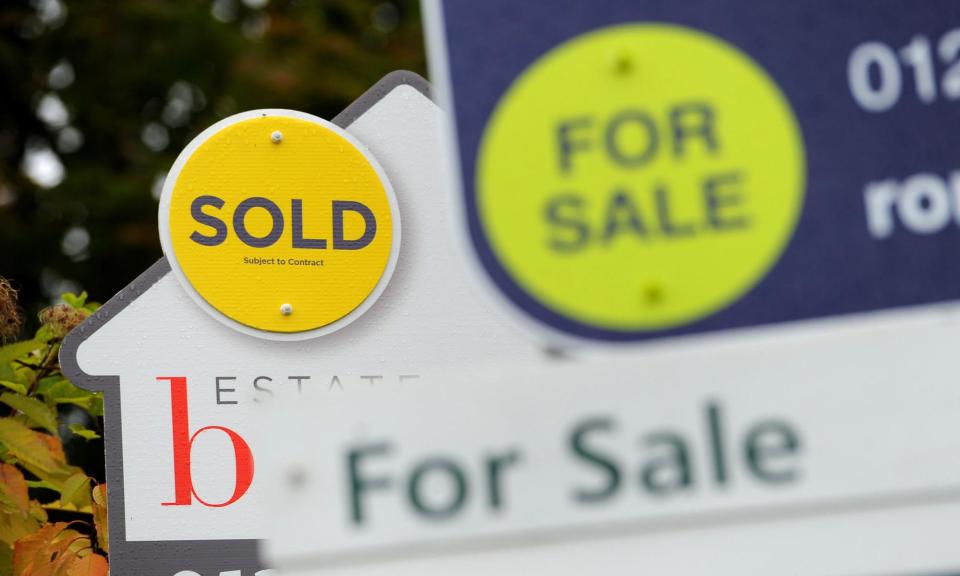Landlords selling up leaving 2,000 households a month in England facing homelessness

More than 2,000 households a month are facing homelessness in England because private landlords say they are selling up, with some blaming uncertainty caused by government delays to renting reforms.
Official figures show that more than four in 10 families who have asked councils for temporary housing after a private landlord ended their tenancy are in the predicament because the owner told them they were putting the property on the market.
Meanwhile, almost a third of landlords plan to reduce their rental portfolios and only 9% say they likely to grow them, a survey by the National Residential Landlords Association (NRLA) found. Stubbornly high interest rates are another key cause of sales, the association said.
Recent data showed that the number of children living in temporary accommodation in England had hit 145,800, a record high and up 12% in a year. The homelessness charity Riverside said this was evidence of a “humanitarian crisis unfolding behind closed doors in towns and cities across England”.
Despite increasing demand, the supply of private housing available to rent is still 50,000 homes below pre-pandemic levels, figures from Rightmove show. The total number of privately renting households, including those in stable accommodation, has hovered around the 4.5m mark for the last decade, according to the English Housing Survey. In that time, England’s population grew by 3.2 million, equivalent to 1.4m households.
On Wednesday, the renters (reform) bill returned to parliament for debate in the House of Lords. The bill is intended to deliver on a promise made by the government five years ago to end no-fault evictions. The ban has been repeatedly delayed and will not come into effect until summer 2025 at the earliest, and then only on new tenancies.
Renters want tougher reforms than currently proposed, including giving tenants four months’ notice rather than two when they are evicted, eviction protections for the first two years of a tenancy and limiting in-tenancy rent increases to the lowest of either inflation or wage growth.
The delays mean ongoing uncertainty about the rules for millions of renters and their landlords.
“Landlords selling up is the single biggest challenge renters face,” said Ben Beadle, the NRLA chief executive. “The only answer is to ensure responsible landlords have the confidence to stay in the market and sustain tenancies. We are calling on peers to support the bill to give the sector certainty about the future.”
The campaign group Generation Rent accused the NRLA of trying to “hold parliament hostage to the idea that they will sell up over even the smallest strengthening of tenants’ rights”.
Ben Twomey, its chief executive, said: “Long term, if landlords sell up it makes little difference to the housing market. Bricks and mortar do not sink into the ground, and the home could be bought by another landlord, a first-time buyer or even repurposed for social housing … The short-term issue is that tenants have an appalling lack of protection when landlords choose to sell up.”
It wants the government to incentivise the sale of homes with sitting tenants and require relocation payments to renters evicted through no fault of their own.
Polly Neate, the chief executive of Shelter, the housing charity, said: “Rental reforms are not driving homelessness, no-fault evictions are. Five years on from the government’s promise to ban no-fault evictions, renters continue to face homelessness in their thousands. With just two months’ notice and no need to give a reason, landlords can throw tenants’ lives into chaos at the drop of a hat. That’s why it’s essential that the renters reform bill is overhauled so tenants have a longer protected period from eviction after moving in and longer notice periods to help them find a new home if a landlord wants to sell or move into the property.”
Neil France, a landlord with four family homes in the Wirral and three houses of multiple occupation in Essex, said five out of seven families who enquired about renting one of his homes in Merseyside were being evicted by their previous landlords who planned to sell.
“You can’t just do away with section 21 evictions without another way to repossess your property and the courts are just not geared up for it,” he said. “Why take the risk of [being a landlord] when you could put the capital in the bank for 5%?”

 Yahoo Finance
Yahoo Finance 